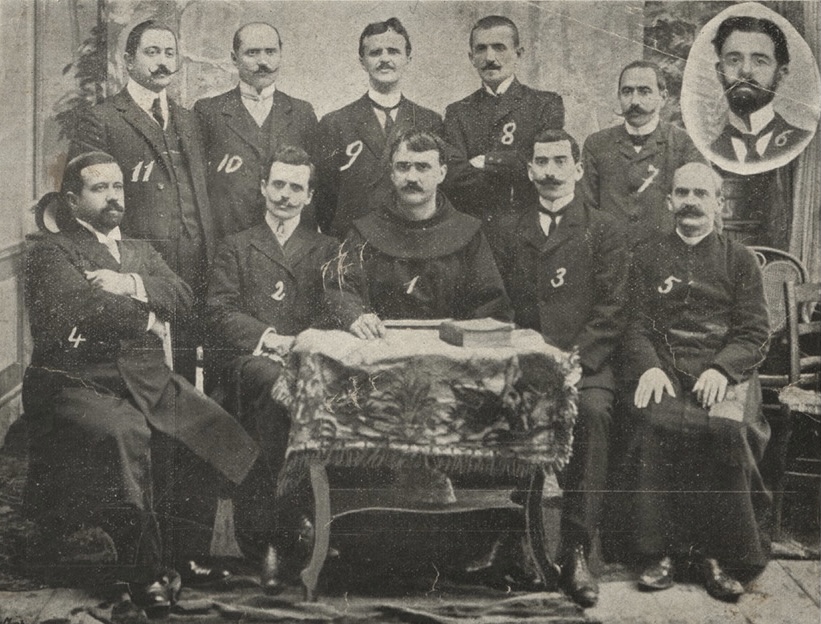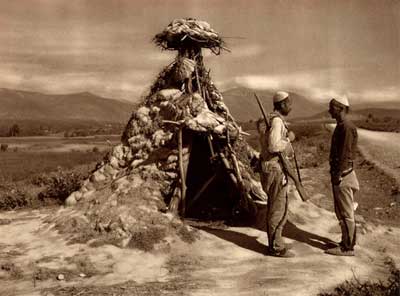|
Albanian Nationalism In North Macedonia
Albanian nationalism in North Macedonia () traces its roots in the wider Albanian nationalist movement which emerged as a response to the Eastern Crisis (1878) and proposed partitioning of Ottoman Albanian inhabited lands in the Balkans among neighbouring countries.. During the remainder of the late Ottoman period various disagreements culminated between Albanian nationalists and the Ottoman Empire over socio-cultural rights. The Balkan Wars (1912–13) ending with Ottoman defeat, Serbian and later Yugoslav sovereignty over the area generated an Albanian nationalism that has become distinct to North Macedonia stressing Albanian language, culture and identity within the context of state and sociopolitical rights. Pan-Albanian sentiments are also present and historically have been achieved only once when western Macedonia was united by Italian Axis forces to their protectorate of Albania during the Second World War. Reincorporated within Yugoslavia, Albanian nationalism in North ... [...More Info...] [...Related Items...] OR: [Wikipedia] [Google] [Baidu] |
Anatolia
Anatolia (), also known as Asia Minor, is a peninsula in West Asia that makes up the majority of the land area of Turkey. It is the westernmost protrusion of Asia and is geographically bounded by the Mediterranean Sea to the south, the Aegean Sea to the west, the Turkish Straits to the northwest, and the Black Sea to the north. The eastern and southeastern limits have been expanded either to the entirety of Asiatic Turkey or to an imprecise line from the Black Sea to the Gulf of Alexandretta. Topographically, the Sea of Marmara connects the Black Sea with the Aegean Sea through the Bosporus and the Dardanelles, and separates Anatolia from Thrace in Southeast Europe. During the Neolithic, Anatolia was an early centre for the development of farming after it originated in the adjacent Fertile Crescent. Beginning around 9,000 years ago, there was a major migration of Anatolian Neolithic Farmers into Neolithic Europe, Europe, with their descendants coming to dominate the continent a ... [...More Info...] [...Related Items...] OR: [Wikipedia] [Google] [Baidu] |
Xhem Hasa
Xhemail Hasani (1908 – 6 May 1945), known as Xhemë Hasa and Xhemë Gostivari, was an Albanian nationalist and Axis collaborator, in charge of the Balli Kombëtar's activities in the western regions of Yugoslav Macedonia, a part of Yugoslavia occupied by Fascist Italy and Nazi Germany during World War II. Early life Xhem Hasa was born in the village of Simnica near Gostivar, and grew up in a poor family with many children. During his childhood, up until his early stages of adulthood, Xhem worked as a farmer on his family's farm. Exile in Albania Hasa murdered the head of the gendarmerie in Gostivar, who had abused the local Albanians, and fled through Mount Korab to Albania where he sought asylum in 1936. He lived on the outskirts of Elbasan, where he was soon joined by two of his brothers, Musli and Abdullah, and their families. Despite escaping, the Yugoslav authority put pressure on Hasa's family to convince him to return to Yugoslavia, where he would be tried for the m ... [...More Info...] [...Related Items...] OR: [Wikipedia] [Google] [Baidu] |
Balli Kombëtar
The Balli Kombëtar (literally ''National Front'') was an Albanian nationalist, Collaboration with Nazi Germany and Fascist Italy, collaborationist, and anti-communist resistance movement during the Second World War. It was led by Ali Këlcyra and by Mid'hat Frashëri, Midhat Frashëri. The movement was formed by members from the landowning elite, liberal nationalists opposed to communism, and other sectors of society in Albania.... The motto of the Balli Kombëtar was: ' (Albania to the Albanians, Death to the Traitors). Eventually, the Balli Kombëtar joined the Nazi Germany-established puppet government as part of the German occupation of Albania and fought as an ally against communist guerrilla groups. The Balli Kombëtar engaged in significant acts of terror culminating in atrocities committed against Serb and Greek civilians. History Although Këlcyra and Frashëri had initiated opposition actions against the Italian authorities almost from the beginning of Italian protec ... [...More Info...] [...Related Items...] OR: [Wikipedia] [Google] [Baidu] |
Greater Albania
Greater Albania () is an irredentist and nationalist concept that seeks to annex the lands that many Albanians consider to form their national homeland. It is based on claims on the present-day or historical presence of Albanian populations in those areas. In addition to the existing Albania, the term incorporates claims to regions in the neighbouring states, the areas include Kosovo, the Preševo Valley of Serbia, territories in southern Montenegro, northwestern Greece (the Greek regional units of Thesprotia and Preveza, referred by Albanians as Chameria, and other territories that were part of the Vilayet of Yanina during the Ottoman Empire),. and a western part of North Macedonia. The combination of the populations of these countries and territories of other countries sustaining large ethnic Albanian communities enumerate to over 4 million people. The unification of an even larger area into a single territory under Albanian authority had been theoretically conceived by ... [...More Info...] [...Related Items...] OR: [Wikipedia] [Google] [Baidu] |
Kachaks
Kachaks (, / ''kačaci'') is a term used for the Albanians, Albanian rebels active in the late 19th and early 20th century in northern Albania, Montenegro, Kosovo and Macedonia (region), Macedonia, and later as a term for the militias of Albanians, Albanian revolutionary organizations against the Kingdom of Serbia (1910–18) Kingdom of Yugoslavia (1918–24), called the "Kachak Movement". Etymology The word is derived from Turkish ''wikt:kaçak, kaçak'' for "outlaw". Background History 1920–24 Kachak movement The Committee for the National Defence of Kosovo, Committee for the National Defense of Kosovo () was created in Shkodër, under Hasan Prishtina, in 1918. The committee organizationally and financially supported the kachaks in Albanian-populated areas of Yugoslavia, in Kosovo and Skopje (the former Kosovo vilayet). Kachaks were also active around Ohrid and Bitola. On 6 May 1919 the Committee called for a general uprising in Kosovo and other Albanian-inhabited regions ... [...More Info...] [...Related Items...] OR: [Wikipedia] [Google] [Baidu] |
Kingdom Of Yugoslavia
The Kingdom of Yugoslavia was a country in Southeast Europe, Southeast and Central Europe that existed from 1918 until 1941. From 1918 to 1929, it was officially called the Kingdom of Serbs, Croats, and Slovenes, but the term "Yugoslavia" () has been its colloquial name as early as 1922 due to its origins. "Kraljevina Jugoslavija! Novi naziv naše države. No, mi smo itak med seboj vedno dejali Jugoslavija, četudi je bilo na vseh uradnih listih Kraljevina Srbov, Hrvatov in Slovencev. In tudi drugi narodi, kakor Nemci in Francozi, so pisali že prej v svojih listih mnogo o Jugoslaviji. 3. oktobra, ko je kralj Aleksander podpisal "Zakon o nazivu in razdelitvi kraljevine na upravna območja", pa je bil naslov kraljevine Srbov, Hrvatov in Slovencev za vedno izbrisan." (Naš rod ("Our Generation", a monthly Slovene language periodical), Ljubljana 1929/30, št. 1, str. 22, letnik I.) The official name of the state was changed to "Kingdom of Yugoslavia" by King Alexander I of Yugosla ... [...More Info...] [...Related Items...] OR: [Wikipedia] [Google] [Baidu] |
First World War
World War I or the First World War (28 July 1914 – 11 November 1918), also known as the Great War, was a World war, global conflict between two coalitions: the Allies of World War I, Allies (or Entente) and the Central Powers. Fighting took place mainly in European theatre of World War I, Europe and the Middle Eastern theatre of World War I, Middle East, as well as in parts of African theatre of World War I, Africa and the Asian and Pacific theatre of World War I, Asia-Pacific, and in Europe was characterised by trench warfare; the widespread use of Artillery of World War I, artillery, machine guns, and Chemical weapons in World War I, chemical weapons (gas); and the introductions of Tanks in World War I, tanks and Aviation in World War I, aircraft. World War I was one of the List of wars by death toll, deadliest conflicts in history, resulting in an estimated World War I casualties, 10 million military dead and more than 20 million wounded, plus some 10 million civilian de ... [...More Info...] [...Related Items...] OR: [Wikipedia] [Google] [Baidu] |
Kingdom Of Serbia
The Kingdom of Serbia was a country located in the Balkans which was created when the ruler of the Principality of Serbia, Milan I of Serbia, Milan I, was proclaimed king in 1882. Since 1817, the Principality was ruled by the Obrenović dynasty (replaced by the Karađorđević dynasty for a short time). The Principality, under the suzerainty of the Ottoman Empire, ''de facto'' achieved full independence when the very last Ottoman troops left Belgrade in 1867. The Treaty of Berlin (1878), Congress of Berlin in 1878 recognized the formal independence of the Principality of Serbia, and in its composition Nišava District, Nišava, Pirot District, Pirot, Toplica District, Toplica and Vranje districts entered the Southern and Eastern Serbia, South part of Serbia. In 1882, Serbia was elevated to the status of a kingdom, maintaining a foreign policy friendly to Austria-Hungary. Between 1912 and 1913, Serbia greatly enlarged its territory through engagement in the First Balkan War, Fi ... [...More Info...] [...Related Items...] OR: [Wikipedia] [Google] [Baidu] |
Young Turks
The Young Turks (, also ''Genç Türkler'') formed as a constitutionalist broad opposition-movement in the late Ottoman Empire against the absolutist régime of Sultan Abdul Hamid II (). The most powerful organization of the movement, and the most conflated, was the Committee of Union and Progress (CUP, founded in 1889), though its goals, strategies, and membership continuously morphed throughout Abdul Hamid's reign. By the 1890s, the Young Turks were mainly a loose and contentious network of exiled intelligentsia who made a living by selling their newspapers to secret subscribers. Included in the opposition movement was a mosaic of ideologies, represented by democrats, liberals, decentralists, secularists, social Darwinists, technocrats, constitutional monarchists, and nationalists. Despite being called "the Young Turks", the group was of an ethnically diverse background; including Turks, Albanian, Aromanian, Arab, Armenian, Azeri, Circassian, Greek, Kurdish, and Je ... [...More Info...] [...Related Items...] OR: [Wikipedia] [Google] [Baidu] |
Debar
Debar ( ; , sq-definite, Dibra or Dibra e Madhe) is a city in the western part of North Macedonia, near the border with Albania, off the road from Struga to Gostivar. It is the seat of Debar Municipality. Debar has an ethnic Albanian majority of 74% and is North Macedonia's only city where ethnic Macedonians do not rank first or second demographically. The official languages are Macedonian and Albanian. Name The name of the city in Macedonian is ''Debar'' (Дебар). In Albanian; ''Dibër''/''Dibra'' or ''Dibra e Madhe'' (meaning "Great Dibra", in contrast to the other Dibër in Albania). In Serbian ''Debar'' (), in Bulgarian ''Debǎr'' (), in Turkish ''Debre'' or ''Debre-i Bala'', in Greek, ''Dívrē'' () or ''Dívra'' (), in Ancient Greek ''Dēvoros'', Δήβορος and in Roman times as ''Deborus''. Geography Debar is surrounded by the Dešat, Stogovo, Jablanica and Bistra mountains. It is located 625 meters above sea level, next to Lake Debar, the Bla ... [...More Info...] [...Related Items...] OR: [Wikipedia] [Google] [Baidu] |





